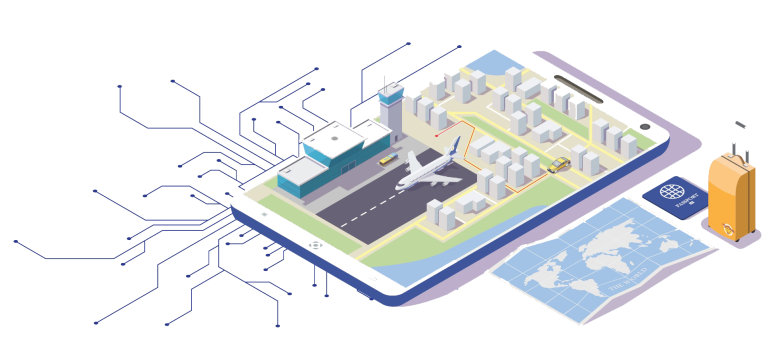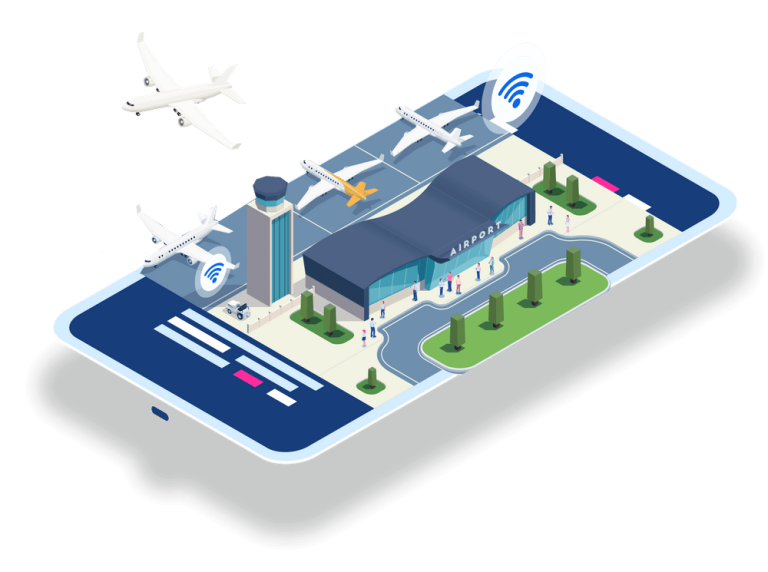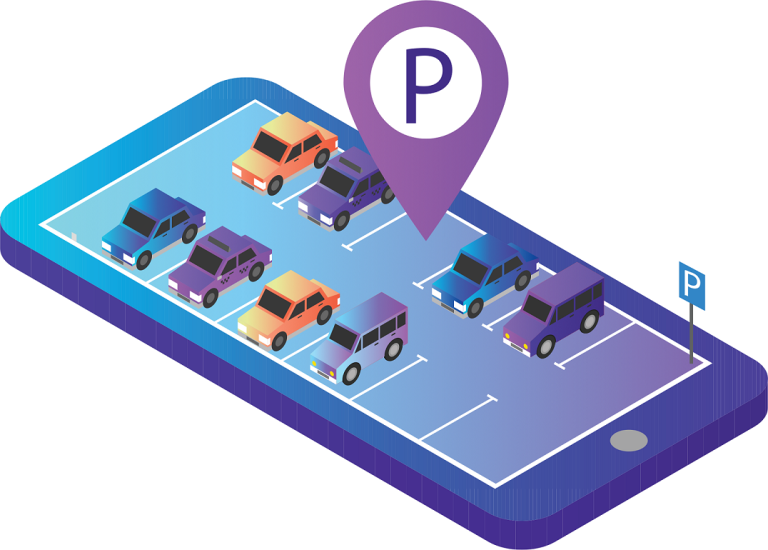فرودگاه هوشمند
مفهوم فرودگاه هوشمند تحول بزرگی در عملیات فرودگاهی ایجاد کرده است و صنعت هوانوردی را به طور چشمگیری به سمت تطبیق با فناوریهای مدرن سوق داده است. اینترنت اشیاء، هوش مصنوعی و تعمیر و نگهداری هوشمند تنها چند مورد از فناوریهای پیشرفتهای هستند که در توسعه و بهبود فرودگاهها نقش دارند. با توجه به رشد سریع حجم مسافران فرودگاهی، طراحی و توسعه برنامههایی که به بهبود خدمات و افزایش رضایت مسافر کمک کند از مسائل مهم و حیاتی است. برای رسیدن به این مهم بسیاری از پژوهشگران و فرودگاههای بینالمللی در حال توسعه و استقرار سیستمهای هوشمند از جمله پارکینگهای هوشمند هستند. پارکینگ هوشمند به طور موثر زمان جستوجو و پیداکردن فضای دردسترس در پارکینگ را کاهش میدهد و مستقیماً بر رضایت و راحتی مسافران تأثیر میگذارد. این سیستمها همچنین مصرف سوخت و انتشار دیاکسیدکربن را به طور قابل توجهی کاهش میدهند.
تعاریف متنوعی در پژوهشهای مختلف برای فرودگاه ۴.۰ که با عنوان فرودگاه هوشمند نیز شناخته میشود، وجود دارد. لازم به ذکر است که تعریف فرودگاه هوشمند با تعریف شهر هوشمند مرتبط است. شهرهای هوشمند از فناوری برای زندگی شهری و ایجاد محیطی راحت و پایدار استفاده میکنند. فرودگاه هوشمند زیرمجموعه چنین شهر هوشمندی است. در این زیرمجموعه زندگی شهری و پروازهای هواپیما به یکدیگر متصل هستند و اطلاعات به راحتی بین مدیریت حمل و نقل شهری، کنترل ترافیک هوایی و خطوط هوایی تبادل میشوند. این اتصال باعث بهینهسازی فرآیندها و عملکرد فرودگاه شده و افزایش رضایت مسافران را به همراه دارد.
پیشرفتهای اخیر در فناوریهای اینترنت اشیاء و هوش مصنوعی بسیاری از بخشهای زندگی از جمله زیرساختها و حملونقل را متحول کرده است. به عنوان مثال، سازمانهای مدیریت شهری اکنون از دوربینهای متعددی برای ثبت جریان ترافیک روزانه در سراسر شهرها استفاده میکنند. چنین امری منجر به تولید حجم عظیمی از داده شدهاست که در صورت پردازش کارآمد، امکان استفاده مفید از زیرساختهای حملونقل شهری، جلوگیری از ترافیک و کاهش/پیشگیری از حوادث و جرایم را فراهم میآورد. در سالهای اخیر، فناوریهای هوش مصنوعی نقش مهمی در پردازش این نوع دادهها داشتهاند.

پارکینگ هوشمند
ایده پارکینگ هوشمند در ابتدا برای حل مشکل مدیریت پارکینگ در کلان شهرها معرفی شد و پژوهشگران برای تحقق این ایده از الگوریتمهای IoT و ML به منظور ردیابی در دسترس بودن فضای پارکینگ، حداکثر استفاده از امکانات پارکینگ و به حداقل رساندن زمان جستجوی کاربران برای فضاهای موجود استفاده میکردند. ردیابی در دسترس بودن فضای پارکینگ، پایه و اساس هر سیستم مدیریت پارکینگ هوشمند است.
با افزایش مسافران و سفرهای هوایی، سهم حاصل از درآمدهای غیرهوایی از جمله خدمات پارکینگ نیز به طور قابل توجهی افزایش پیدا کرده است. تاجایی که درآمد حاصل از پارکینگ حدود ۴۰ درصد از درآمدهای غیرهوایی یا ۲۵ درصد از درآمدهای تجاری یک فرودگاه را به خود اختصاص میدهد. به عنوان مثال، فرودگاه سیدنی در استرالیا به سود عملیاتی ۹۷ میلیون دلاری از بخش پارکینگ در سالهای ۲۰۱۶-۲۰۱۷ رسیده است که نشان دهنده سود عملیاتی ۹/۷۱ درصد از درآمد کل این فرودگاه بین المللی میباشد. با این حال، کیفیت خدمات در بسیاری از پارکینگهای فرودگاههای مختلف همچنان با مشکل مواجه است. در بسیاری از فرودگاه، پارکینگ از جمله خدماتی محسوب میشود که باعث نگرانی مسافران شده و میبایست در اسرع وقت توسط مدیریت فرودگاه مورد توجه قرار گیرد.

در حال حاضر، بسیاری از فرودگاههای بزرگ و مجتمعهای تجاری از سیستمهای مدیریت پارکینگ استفاده میکنند. با این حال، اکثر سیستمهای موجود با محدودیتهای زیر مواجه هستند:
- مسافران فقط میتوانند فضای خالی و دردسترس پارکینگ را در یک منطقه کوچک محلی ببینند و اغلب برای این مکانها با یکدیگر رقابت میکنند. از این رو، اطلاعات کافی در مورد فضای موجود در مناطق مجاور و یک مکانیزم مشخص برای رزرو سریع و پارکینگ رایگان وجود ندارد؛
- سیستمهای فعلی اطلاعات دقیقی در مورد وسیله نقلیه پارک شده ندارند. بنابراین، رانندگان نمیتوانند از وضعیت فعلی وسایل نقلیه خود در پارکینگ مطلع شوند. در زمینه پارکینگ فرودگاه، کمک به مسافران در پیداکردن سریع و به موقع وسایل نقلیه پارک شده نیز بسیار مهم است. هیچ یک از سیستمهای کنونی مدیریت پارکینگ فرودگاهی این قابلیت را ندارند؛
- سیستمهای فعلی عمدتاً برای کار در یک محیط داخلی طراحی شدهاند، در حالی که بسیاری از امکانات پارکینگ (فرودگاه) در فضای باز هستند.
استفاده از فناوریهای به روز، برنامههای کاربردی با رابط کاربری ساده و بهینه سازی فرآیندها با راهحلهای مدرن نقش قابل توجهی در بهبود مسائل فوق ایفا میکنند. فرودگاههای هوشمند موفق شدهاند که استانداردهای امنیت هوانوردی را به کمک فناوریهای مدرن بهبود بخشند و رضایت مسافران را افزایش دهند. این فرودگاهها به کمک حسگرهای متصل به اینترنت اشیاء قادر به ارائه اطلاعاتی درمورد فضای پارکینگ هستند که از ازدحان جمعیت جلوگیری نموده و پذیرش مسافران را تسهیل میکنند.
Smart Airport
The concept of smart airport has revolutionized airport operations and has dramatically driven the aviation industry to adapt to modern technologies. The Internet of Things, artificial intelligence, and smart maintenance are only a few of the advanced technologies used in airports. With the rapid increase of air passengers, designing and developing programs which helps to improve services are of great importance. To achieve these goal, many researchers and international airports have made use of intelligent systems, including smart parking. Smart parking effectively reduces the time spent on searching and finding an available space in the parking lot and directly affects the satisfaction and comfort of passengers. These systems also significantly reduce fuel consumption and carbon footprints.
It should be noted that smart airport is closely related smart city. Smart cities employ the state of the art technologies in order to create a convenient and sustainable environment. Smart airport is considered as a subcategory of smart cities. In this environment, urban life and flights are connected to one another, and information is easily exchanged between traffic management, air traffic control, and airlines. This connection optimizes airports’ performance and increases passenger satisfaction.

Smart Parking
The idea of smart parking was initially introduced to solve the challenges of parking management in urban areas. Since then many researchers studied the impact and benefits of IoT and ML algorithms in tracking the availability of parking spaces, optimizing the utilization of parking facilities, and minimizing the time spent on finding an empty spot.
Due to the increase in air passenger, the share of non-air revenue, including parking services, has also increased significantly. For instance, Sydney Airport in Australia reached a profit of 97 million dollars from the parking service in 2016-2017, which represents 71.9% of the total revenue in this international airport. The parking and ground transportation share of non-aeronautical revenues in United States remained relatively unchanged from 2011 through 2018, increasing from 41% to 42%. However, the quality of service in many different airport parking lots still faces problems. In many airports, parking is one of the services that cause concern for passengers and should be addressed by the airport management as soon as possible. Currently, many major airports and commercial complexes use parking management systems. However, most existing systems have the following limitations:
A- Drivers can only see available parking spaces in a small local area and often compete with each other. Hence, there is not enough information about the available space in nearby areas. Developing a mechanism for online reservation and parking management can help solve this issue;
B- The current systems do not have accurate information about the parked vehicle. Therefore, drivers do not have access to information such as the current condition of vehicles in the parking lot. Furthermore, none of the current airport parking management systems have this capability;
C- Current systems are mainly designed to work in an indoor environment, while many parking facilities (airports) are outdoors.

The smart parking system can be considered as a tool to solve parking issues both in the current era and in the future. Furthermore, IoT-enabling techniques need to be given maximum attention, ensuring that they are at the center of planning smart parking systems. Using recent technologies, mobile applications with simple user interface and optimizing processes with modern solutions has a significant role in improving the above mentioned issues. By using these new approaches smart airports have managed to enhance aviation’s security standards as well as passenger satisfaction. Airports now are able to provide information about the parking space using sensors connected to the Internet of Things, which prevent traffic and facilitate the entry/exit process.

